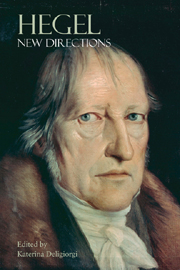Book contents
- Frontmatter
- Contents
- Contributors
- Acknowledgements
- Abbreviations
- Introduction: On reading Hegel today
- 1 Hegel on conscience and the history of moral philosophy
- 2 The apperceptive I and the empirical self: towards a heterodox reading of “Lordship and Bondage” in Hegel's Phenomenology
- 3 Hegel, McDowell and recent defences of Kant
- 4 Substance, subject and infinity: a case study of the role of logic in Hegel's system
- 5 Dialectic as logic of transformative processes
- 6 Hegel, ethics and the logic of universality
- 7 Recognition and reconciliation: actualized agency in Hegel's Jena Phenomenology
- 8 The contemporary relevance of Hegel's practical philosophy
- 9 Catching up with history: Hegel and abstract painting
- 10 New directions in Hegel's philosophy of nature
- 11 Hegel and the gospel according to Immanuel
- 12 What is conceptual history?
- 13 On Hegel's interpretation of Aristotle's psyche: a qualified defence
- Bibliography
- Index
11 - Hegel and the gospel according to Immanuel
- Frontmatter
- Contents
- Contributors
- Acknowledgements
- Abbreviations
- Introduction: On reading Hegel today
- 1 Hegel on conscience and the history of moral philosophy
- 2 The apperceptive I and the empirical self: towards a heterodox reading of “Lordship and Bondage” in Hegel's Phenomenology
- 3 Hegel, McDowell and recent defences of Kant
- 4 Substance, subject and infinity: a case study of the role of logic in Hegel's system
- 5 Dialectic as logic of transformative processes
- 6 Hegel, ethics and the logic of universality
- 7 Recognition and reconciliation: actualized agency in Hegel's Jena Phenomenology
- 8 The contemporary relevance of Hegel's practical philosophy
- 9 Catching up with history: Hegel and abstract painting
- 10 New directions in Hegel's philosophy of nature
- 11 Hegel and the gospel according to Immanuel
- 12 What is conceptual history?
- 13 On Hegel's interpretation of Aristotle's psyche: a qualified defence
- Bibliography
- Index
Summary
Some time during his last few months at the Tübingen Stift, the theological seminary, or possibly just after moving to take up a post as house-tutor in Berne in October 1793, Hegel penned the short essay Religion ist eine, or the “Tübingen Fragment”, as it used to be known. Whenever this relatively brief text was composed, it basically represents Hegel's first piece of independent work, written entirely for his own purposes and definitely not intended for the eyes of his teachers. It merits careful examination in so far as it is thematically linked with all the subsequent writings of the Berne period (1793–98). For the first time in many years Hegel was finally able to express his own developing views on Christian theology and religion directly, to speak “the truth that can stand forth freely and openly before all”, as he put it with coded Enlightened pathos in one of the “Sermons” with which he was periodically obliged to regale his fellow students at the Stift (D: 181). In a similar spirit he wrote to Schelling in 1794 shortly after escaping the suffocating physical and intellectual confines of the seminary: “I believe the time has come when one should speak out more freely in general, as indeed in part people already can and do” (Br 1: 11). The result is an acerbic settling of accounts with all the “rubbish” and “verbal junk” of the pseudo-Kantian theologians of Tübingen and the copious “troop of parrots and scribblers devoid of every thought or higher interest” (Br 1: 16–17) associated with them.
- Type
- Chapter
- Information
- HegelNew Directions, pp. 193 - 206Publisher: Acumen PublishingPrint publication year: 2006
- 1
- Cited by

